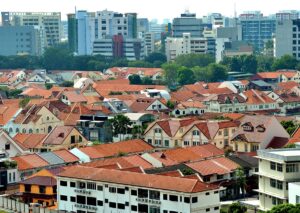We understand how frustrating it can be for your Home Loan In-Principal Approval (IPA) to get rejected. With so many benefits hinging on the IPA, you might also feel like you don’t know how to gauge how much you can afford to pay for your new home anymore.
If you’re feeling lost, we want to help you. But, before we look into what you can do now, let’s look at the possible reasons why your IPA might have been rejected.
Apart from giving you some understanding and peace of mind, it might also help you understand what you can change to improve your chances of any future applications.
Why was your IPA for your home loan rejected?
Typically, your IPA application will revolve around your financial standing. If your financial standing isn’t exactly favourable in the current situation, you should consider that this might not be the right time to purchase a new property.
If your bank rejected your IPA, your advisors might share why it was denied, and explain any outstanding points that can be addressed.
Consider following the steps advised to help improve your chances of getting it. Take this as an opportunity to conduct a self-assessment on your financial situation and if buying a home is indeed something you want to do right now.
Here are some reasons why your home loan IPA may have been rejected.

1. You are/have declared bankrupt
If you’re currently bankrupt or have a history of being bankrupt, this will reflect on your credit report. As a result, banks and financial institutions might find it highly risky to lend you money. This might make it hard for you to borrow money even if you need to.
On the plus side, there is something you can do about it.
- You could get your Bankruptcy Order annulled
You can get your Bankruptcy Order annulled if you pay your debt in full, or if you make a settlement offer of at least 75% of the total debt you owe.
If creditors accept your settlement, then you can be issued a Certificate of Annulment. With your Bankruptcy Order annulled, you’re now in the position of a person who has never had a Bankruptcy Order made against them.
However, note that this doesn’t release you from any provable debts filed against you when your bankruptcy was happening.
- You could get an Order of Discharge from the High Court
If you’re bankrupt, one option you have is to apply for an Order of Discharge from the High Court. In a situation like this, the High Court will decide whether to discharge you based on your creditors’ standing and the Official Assignee.
There will also be other factors that are taken into account, like the bankrupt’s age, earning capacity and assets. The High Court will also take your monthly instalment payments, considering if you’ve made any bankruptcy offences and assessing if you’ve co-operated fully with the Official Assignee with the bankruptcy estate’s administration.
- You could get discharged by the Official Assignee
The Official Assignee can also discharge bankrupts. If you’re bankrupt, what that means for you is that you may not have to go to the High Court, as long as at least 3 years have elapsed since your bankruptcy began and if your proven debts don’t exceed S$500,000.
Some other factors come into consideration, like whether you’ve committed any offence leading up to or during the bankruptcy, which had an adverse effect on one or more creditors. You can read those factors for consideration on the Ministry of Law’s website.
2. You have a bad credit history
As opposed to bankruptcy, bad credit history is much easier to work past since you can resolve it without going to the High Court or Official Assignee.
You might have a bad credit history if you’ve missed some payments, had your car repossessed, or had any of your credit cards suspended or revoked, amongst other things.
Events such as these show poor financial management on your end, counting against your credit score. If you’ve got a history of poor repayment, you might end up with your IPA getting denied with little hesitation, as banks might not trust in your ability to repay your mortgage loan.
Where possible, pay off your credit card and personal card loans punctually.
3. You had a poor relationship with your bank
Bad run-ins with your bank might result in your IPA being rejected. As with any bank loan, a bank might consider the past relationship you’ve had with them before deciding whether to give you an IPA for your home loan in Singapore.
Not sure what a poor relationship means in this case? Well, it might be if you had a history of poor repayment conduct.
In situations such as these, your bank may blacklist you no matter your credit score. In cases such as these, you can try applying for IPA with another bank for your home loan in Singapore
We discuss bank loans vs HDB loans in this article
4. Your employment status has changed during the application
In order to help gauge how to determine your IPA for your bank loan, banks might look at your source of income and job security.
If you’ve been at your place of employment for at least 2 to 3 years, this might improve your chances of getting IPA approval for your home loan.
But, don’t worry too much. If you’ve just changed your job recently, the duration of your previous job might be taken into account, while your new company might also be factored into consideration.

5. You might not have enough working years left to repay your home loan in Singapore
If you’ve got more years ahead of you before the retirement age of 65, this means you can secure a longer-term loan and thus be able to loan more money securely.
If your IPA got rejected due to age, a bank might have deemed that you might not be able to repay the entire loan for your home loan comfortably.
For a hefty bank loan such as a mortgage, it’s best that you maximise your bank loan and apply to buy a new home at 30 years of age and get a loan with a healthy 30-year tenure.
READ: Should I opt for a longer or shorter loan tenure?
6. You might have too many credit facilities
Think of every form of credit that you currently have, whether it’s your credit card bills, a car loan that you’re paying off, or any other bank loan that you might have.
These factors contribute to your Total Debt Servicing Ratio (TDSR), which states that only 60% of your gross monthly income should go toward servicing home loans.
If your TDSR has been maxed out, then the IPA for your home loan might get rejected. And if your TDSR is leaning toward being maxed out soon, banks might issue you an IPA for a significantly smaller loan amount.
Check out more about TDSR here
For HDB property and EC directly from the developer, there’s also the Mortgage Servicing Ratio (MSR) that’ll be taken into account. This measure stipulates that only 30% of your gross income should go toward your home loan in Singapore.
Here’s one tip: don’t withdraw cash from your credit cards, as this is deemed poor credit behaviour.
7. Your IPA application was incomplete/inaccurate
Documentation, evidence, and paperwork are required for any loan, home loans in particular, due to the amount involved.
If your application is incomplete, inaccurate, or if you submit false information or your signature does not match, it will not be processed. This may result in your home loan IPA getting rejected. Always check your application.
Have more questions about In-Principle Approval (IPA) for your private property/HDB home loan?
Getting IPA for your home loan in Singapore can be helpful, with a key benefit being that it allows you to make substantial financial plans for your home.
But if your IPA application got rejected, you might be feeling lost, demoralised, and unsure of what to do. As mortgage brokers in Singapore, we can advise on what your next best steps might be. There are still other ways to go about buying your house, and we’ll hold your hands through the process.
Learn more about getting a home loan through a mortgage broker here.








